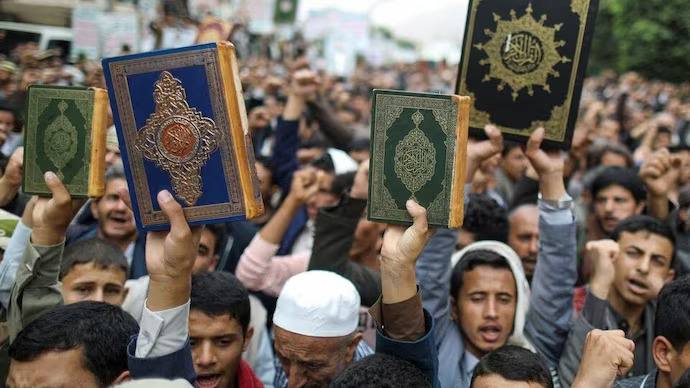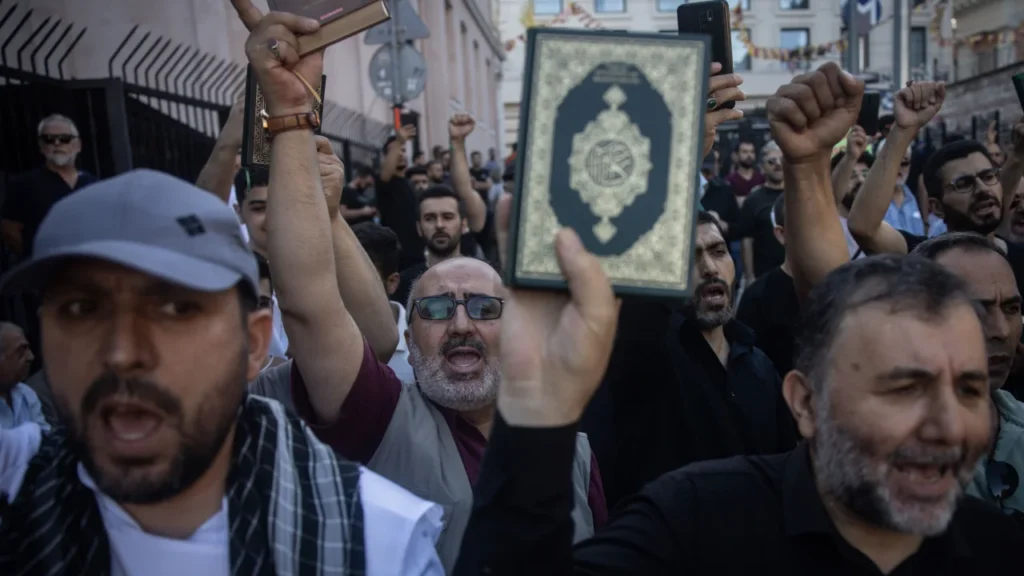In 2023, there were a number of incidents involving the burning and desecration of the Quran in Sweden and Denmark. These incidents have drawn attention both nationally and internationally, sparking debates about religious tolerance, freedom of expression, and community cohesion. International protests and outrage have been reported across the world, especially in Islamic countries. Following burnings in Sweden, Quran-burning incidents were reported in Denmark.
Incidents
In January 2023, Swedish politician Rasmus Paludan burned a copy of the Quran outside the Turkish embassy in Stockholm. In retaliation, Turkish authorities briefly suspended talks regarding Sweden’s NATO membership. In July, during Eid al-Adha, Iraqi refugee Salwan Momika tore a copy of the Quran, placed a strip of bacon on it and set it on fire outside the Stockholm Mosque. This incident was followed by numerous requests for permits to burn the Quran and other religious books in Sweden.
In July 2023, Danish politician Danske Patrioter burned a copy of the Quran outside the Iraqi embassy in Copenhagen. The following day, copies were burned outside the Egyptian and Turkish embassies in Copenhagen. Led by a group called Danish Patriots, at least 10 copies were burned in Denmark in July.

Protests and International Response
The incidents were followed by protests, especially outside Swedish and Danish embassies, in several countries. In July, protestors stormed the Swedish embassy in Baghdad and set the place on fire. Iraq’s government expelled the Swedish Ambassador and suspended all diplomatic ties with Sweden. They have revoked the work permits of several Swedish businesses in the country. Iraqi authorities also issued a warning to Denmark. Afghanistan banned all activities involving Sweden until an apology is issued. Iran has called for a death penalty for the perpetrators. The Moroccan government recalled its ambassador from Sweden. Other countries including Turkey, Jordan, Indonesia, Egypt and Israel condemned the incidents.
Government’s Response
The Swedish government responded by reaffirming its country’s commitment to freedom of expression while also emphasizing the need for responsible and respectful behavior. Government officials condemned Quran burning as acts that promote divisiveness and disrespect. In August, the Swedish Security Service raised the terrorist threat level from level 3 (‘elevated’) to level 4 (‘high’) on a 5-level scale. Swedish authorities have also stepped up and tightened border controls and identity checks at crossing points. Swedish Prime Minister Ulf Kristersson said that Sweden is in the most serious security situation since the Second World War.
Danish authorities have condemned the burnings as deeply offensive and non-representative of Danish values. Denmark has also tightened its border control measures.

Sweden and Denmark have some of the most liberal laws, championing freedom of speech and expression. Laws punishing blasphemy were repealed in 1970 and 2017 in Sweden and Denmark respectively. In Sweden, a permit must be obtained from the police, with refusal contingent upon public safety concerns. In Denmark, police must be notified of planned protests. The Swedish government is exploring potential amendments to its public order laws to manage such situations. Denmark is actively seeking a “legal tool” that could enable intervention if protests are deemed to pose significant negative consequences for the country, particularly security-wise.
Conclusion
The international response to the Quran-burning incidents in Sweden and Denmark aptly demonstrates how isolated actions can reverberate into broader security considerations and influence travel perceptions of the most unlikely countries. The resulting protests, diplomatic expulsions, and calls for action also reflect the connection between religious identity and political expressions in today’s modern world. As the two countries attempt to address the aftermath by limiting some rights, domestic backlash is inevitable.
For more information about the current happening, subscribe to our blog. Follow for more updates at Sitata.



